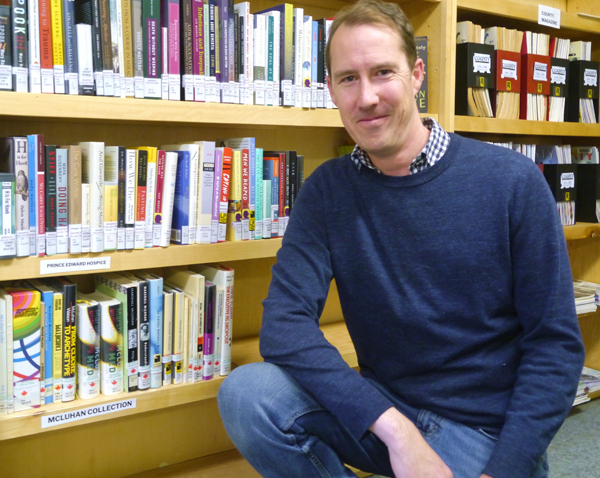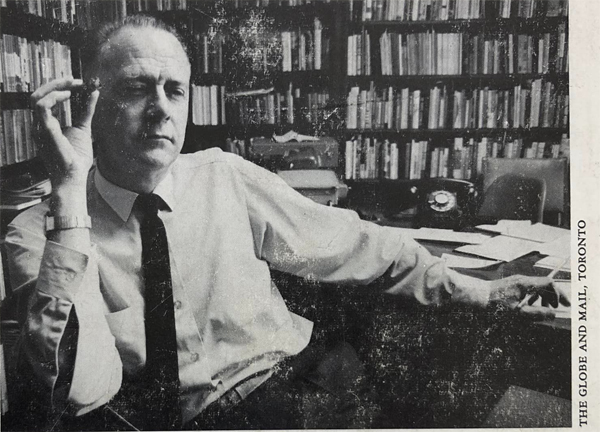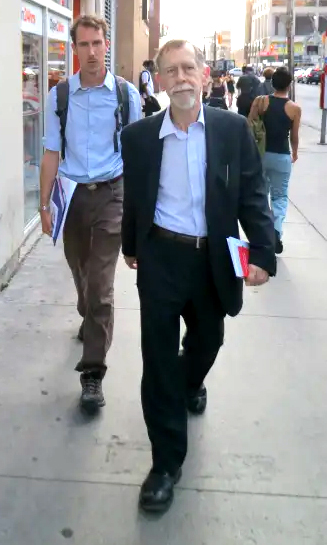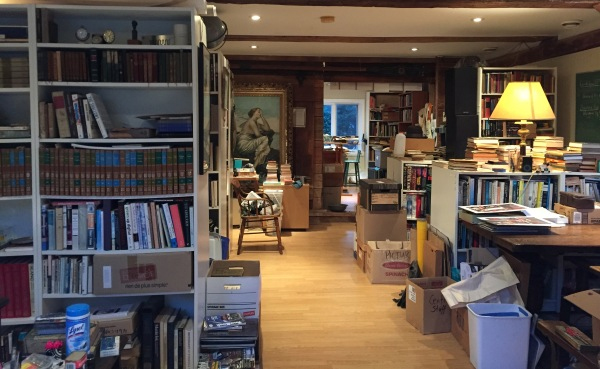Andrew McLuhan on keeping his grandfather Marshall’s legacy relevant
Administrator | Dec 28, 2022 | Comments 1

Andrew McLuhan at the Bloomfield Branch Library, beside the McLuhan collection.
By Sharon Harrison
County resident Andrew McLuhan spoke to a small audience at the Bloomfield branch library about growing up as the grandson of Marshall McLuhan, where he outlined the path he is navigating to continue his renowned grandfather’s important legacy, through his own unique initiative.
To ensure Marshall’s work continues on in new and innovative ways, Andrew came up with the idea to create the McLuhan Institute (known as TMI). He spoke to progress made so far, current projects, and outlined the vision he has for TMI.
“I am building the McLuhan Institute to continue the work he and my father Eric McLuhan began in understanding the nature of media.”
Andrew has grand plans for TMI, saying he wants to continue the McLuhan studies and McLuhan tradition.
“It will be a world-class research institute, archive, museum, centre for learning and exploration, refuge and incubator for all kinds of arts”, but he acknowledges his ideas are “a little bit grandiose”.
“I am the kind of person who believes in shooting for the stars and if you end up on the moon, that’s still pretty impressive,” he says. “You can always bargain down, but it’s hard to bargain up. Always set your sights higher than even you think are possible, and you’ll get somewhere good and you may even get further.”

Marshall McLuhan book cover
Marshall is considered by many as one of the pioneers of a particular type of media studies, the study of effect of innovation and technology on humans and culture.
“What he did that was different, and I always remind people that he was actually an English teacher for his entire career,” explained Andrew, “he started in English literature and he became quite well-known as a literary critic and educator before he got well-known for his side hustle, which was media studies.”
“Basically, what he did that was different was he took what he had learned for approaching literature and turned those tools of literary criticism onto technology and culture which was a new thing, and is basically the thing he did.“
While TMI isn’t open to the public yet, Andrew explains how his young family sold their Picton home two years ago and bought his parents property located near Bloomfield where he hopes to eventually develop it to be a destination where people can come.
The property includes a two-storey barn attached to a three-story barn, where Andrew notes the two-storey former pig or sheep barn was converted by his dad to his office and archive.
The hope is talks can take place there, exhibitions too, weekend workshops and retreats, as well as a space for the artistic exploration for shows and other events that relate to exploring and understanding culture and technology.
“My focus in not on building monuments, not on theories, but on tools we can use today to help us understand where we are heading, and more importantly, advocating for more intentional development of technology, so that we are not always playing catch up and trying to fix our messes, but ideally getting ahead of them.”
To provide a little context, Marshall McLuhan is described as a Canadian educator, philosopher, and scholar, and a professor of English literature. Andrew describes him as a thinker, a media pioneer, but also a person.
Marshall died on New Year’s Eve in 1980 aged 69 when Andrew was only two-and-a-half years old. Two years earlier, Marshall had a stroke which rendered him unable to communicate.
“He couldn’t read, he couldn’t write, he could whistle or sing sometimes; occasionally he could say something that made any sense, but really all he could do was babble,” explains Andrew.
“Apparently, occasionally, he would say “oh boy, oh boy, oh boy, oh boy” or things like that and the funny thing is, I was just starting to speak and apparently we would have these nonsense conversations, which I have no memory of obviously, but I like to think it sounded like nonsense to anybody else, but to us, it was obviously important things we were discussing.”
Andrew said his grandfather was expected to recover from the stroke and they were trying to teach him to speak again, but he died suddenly.
So Andrew had to get to know Marshall just like anybody else, through his work and through the things that he left behind, but he also recognizes, because of the time we live in, his grandfather remains very present over different types of media, in print media, visual and audio.
“It’s a privilege to be able to get to know somebody after they have died because they are so present. He may be gone, but he is such a continuous presence and it is not just family photos or maybe a recorded wedding speech or something, there are hundreds of hours of content out there just in audio and video, never mind other articles, interviews, etc. so that’s an odd thing.”

Andrew and his dad Eric McLuhan on tour
Andrew’s dad, Eric McLuhan, had been working with his father since the mid-60s as his personal assistant, where he continued after Marshall’s death, and had Andrew join him in 2009/2010.
“When Marshall died, no one was expecting it and there wasn’t any plan really to keep going. My dad was working with Marshall very informally and he was left without a plan of any sort.”
He explains his dad, in his mid-70s in 2016-2017, was not in the greatest health. He died suddenly in spring 2018 when they were in Colombia together.
“I didn’t want to be caught without a plan, so I came up with this idea for TMI,” explains Andrew, noting nobody else was going to take on the challenge. While he has sisters living in the United States, Andrew says they weren’t interested in continuing the work.
“I felt that this was something that needed to be maintained and preserved, that is constituted an intellectual tradition,” he says. “I was there and I found myself getting more and more interested; I figured that if I didn’t do anything, nobody elee would, and it was worth doing.”
Andrew admits when he was younger, his grandfather’s work was of little interest to him.
“It didn’t make any sense at all and I tried to read it as a teenager and it just went over my head, and I tried again in my 20s and didn’t get much further,” he said. “But I found in my 30s, my dad needed someone to travel with him to do the talks and I found these things made a little bit of sense for the first time.
“A little understanding goes a long way and it can be seductive, if not an addictive thing, it makes you want to learn more and understand more,” said Andrew. “I guess I had grown up, your brain matures, your thoughts mature and I was just at a point where I was ready for this kind of thing and I started getting more and more involved.”
 His dad left behind a library and archive of around 6,000 books and some artifacts. Essentially everything that didn’t end up at the archives in Ottawa or Toronto resides in the County.
His dad left behind a library and archive of around 6,000 books and some artifacts. Essentially everything that didn’t end up at the archives in Ottawa or Toronto resides in the County.
“My dream is definitely to open it up to the public, to be able to display it in an open-type setting.”
He talks about how Prince Edward County has been a destination for a century or more. “It hasn’t been a backwater for a long time,” he adds as he talks about the County’s recent growth and how the wine industry has been an attraction for visitors, the food industry too, and recreationally it is a big draw, so he is hoping TMI can provide more educational or intellectual reasons to visit here.
“To come for a weekend, fill your head with some ideas, go sample some wine, hit the beach, things like these could go together really well. This is my idea basically, to set up this research facility.”
Andrew speaks to the work as being “really heavy lifting on the brain” where he embraces the rural location that allows him to easily step away to take a walk up the lane through some fields with the dog when he needs a break or allow his thoughts to breathe.
The idea for TMI came to Andrew in summer 2017, just less than a year before his dad died where he was anticipating the day his dad wouldn’t be around.
“That happened way sooner than I was expecting, but at least I had already started to think about it.”
Andrew describes himself as a poet, a punk rocker and someone who ran an upholstery company for a decade.
Surprisingly, he says he is not an academic.
“I barely graduated high school. I used to think that not going to university was a liability, but now I realize it’s more of an asset because it means that I don’t speak like somebody who has been to university. I don’t try and put that on, I relate to things more politely and humanistically person-to-person.
“I honestly think that if I can understand this stuff, then anybody can, not that it’s simple, but if you do a little bit of work, you can figure it out.”
“Another thing that gives me hope is that I teach classes for Grade 5 and 6 students and I teach classes for university students and corporations, and to me it’s a testament to accessibility if I can explain or help,” said Andrew. “I don’t think in terms of explaining, I think more of helping people understand or to learn on their own these concepts. If kids can get it, the rest of us can, and that’s a really powerful thing.”
Andrew says he works with his hands and is interested in practical things, not so much in theory.
“I think we are at a time in our society where we need more than theory; we need practical things.”
He says his interest with TMI is not so much to create a monument or historical things (although he has historical things to preserve).
“My focus, I decided, would be what’s useful from what Marshall and my father did in order to help us going forward.”
“Marshall may have been a genius, but he wasn’t a wizard, he had methods, he developed ways of looking at technology in order to understand them,” explains Andrew. “So I decided the best thing that I could do would be to identify and extract these tools.”
He said a lot of the reason why Marshall’s work endured is because it’s not situated on television or the printed word, it is situated on media, on technology and innovation.
He said as long as the world continues to innovate and come up with new technologies, there needs to be new ways of looking at them.
“A lot of what Marshall did was not specific to any one technology, but he looked at technology as a field and developed methods for analyzing and understanding of it.”
He said the logical progression there is to move from studying what happened, to anticipating what might happen, and “have that inform what we actually might do because we are at a point in history where if we don’t start doing, that things don’t look so good.”
Marshall’s work focused on what he called the social and personal consequences of technologies, explains Andrew.
“How technologies, innovations, change, who we are personally, like individually, and then by extension, society, and that the lion’s share of changes come from changing society and that whole environment.”
Andrew has identified four key areas for TMI, namely research, education, archive and exploration, but he says a big part of what he wants to do is arts based.
He notes that his grandfather relied heavily on the arts in his career and to understand technology he quotes Ezra Pound who said, ‘the artist is the antenna of the race’ (ABC of Reading, 1934).
“What they meant is that artists are people in society who are constantly sharpening their perceptive faculties,” explains Andrew. “For the rest of us, children and artists are always the sharpest among us, the rest of us, our senses dull over time.
“Things don’t taste as sweet or as sharp as they used to. All of our senses start to dull in atrophy from underuse and just getting old, but artists are constantly out there trying to experience things in new ways and trying to relate them to us in new ways,” he says. “And because of this, they get a sense of technological change before the rest of us, and that is not to say they understand it any better than the rest of us, but they sense it better than the rest of us, and because of this they are very useful.”
Part of what he does is maintain the artifacts he has, such as the working library, and on-going research into developing tools for understanding.
“The way I bring those forward are through talks like this, I give workshops, I teach classes, I developed a class on Understanding Media (Marshall McLuhan, 1964).”
Andrew’s purpose with TMI is to create a place that people can discover online as well as in person.
“It’s important for me to do both and that’s because not everybody can come here. My preference, and I think the reward ratio is much higher, is when you interact in person.”
His current class of about 20 students, for example, is spread out from Europe and England, through North America (Ottawa, Edmonton), Los Angeles, New York, Brazil and all points in between, but Andrew is quick to acknowledge that accessibility is important.
“Accessibility in two senses of the word, in just people being able to access things, so just basically an open door policy; but what’s the point in being able to access something if you can’t make any sense of it? There’s an intellectual accessibility that I think is important.”
One of his goals is to invite artists of various media, musicians, visual artists, artists of all kinds, to enter a work that demonstrates what the medium is the message means today. This will allow an historical artistic record to develop of what the impact of technology is every year and how that shifts and changes.
“In other words, what is our sensorial make-up, what is the effect of technology today and don’t explain it to me, but show me, demonstrate it through music, demonstrate it through visual work, but show me, so every year we can have an in-person and online exhibition.”
“That’s purposefully a very broad category. It doesn’t need to be somebody who has a big record as an artist or an established whatever. In fact, the more immature the better in a certain sense. The key criteria is exploration, so I want it to be open and then have a yearly show.”
“Here I am at TMI trying to be a bridge to the past and the present, and the future,” said Andrew. “Of course, having an idea and making something of it are different things, so the challenge is always, that’s great, but how do you do that, how do you make it sustainable?”
A recording of Andrew McLuhan’s hour-long talk on the McLuhan Institute is expected to the uploaded to the Prince Edward County Public Library website soon. More information on the McLuhan Institute can be found at themcluhaninstitute.com
Filed Under: Arts & Culture • Featured Articles
About the Author:

































What an interesting story about an interesting person. I think this is important and timely work, built on a strong foundation. Our community is lucky to have such a resource.